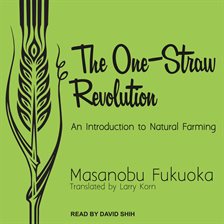
In this book, Fukuoka described his philosophy of natural farming and why he came to farm the way he did. Fukuoka's inspiring and internationally best-selling book, The One-Straw Revolution was first published in English in 1978.

This method, which he called "natural farming," involved working with, not in opposition to, nature. He returned to his home village and applied this insight to developing a revolutionary new way of farming that he believed would be of great benefit to society. While working there, Fukuoka had an insight that changed his life forever. This was in the 1930s when science seemed poised to create a new world of abundance and leisure, when people fully believed they could improve upon nature by applying scientific methods and thereby reap untold rewards. As a young man he worked as a customs inspector for plants going into and out of the country. Fukuoka grew up on a farm on the island of Shikoku in Japan. We need to change not only our methods of earth stewardship, but also the very way we think about the relationship between human beings and nature. And, according to Masanobu Fukuoka, it is reversible.

This present condition of global trauma is not "natural," but a result of humanity's destructive actions.

Whether you’re a guerrilla gardener or a kitchen gardener, dedicated to slow food or simply looking to live a healthier life, you will find something here-you may even be moved to start a revolution of your own.ĭescription: The earth is in great peril, due to the corporatization of agriculture, the rising climate crisis, and the ever-increasing levels of global poverty, starvation, and desertification on a massive scale. Over the next three decades he perfected his so-called “do-nothing” technique: commonsense, sustainable practices that all but eliminate the use of pesticides, fertilizer, tillage, and perhaps most significantly, wasteful effort. It is an inspiring, necessary book about agriculture because it is not just about agriculture.” Trained as a scientist, Fukuoka rejected both modern agribusiness and centuries of agricultural practice, deciding instead that the best forms of cultivation mirror nature’s own laws. As Wendell Berry writes in his preface, the book “is valuable to us because it is at once practical and philosophical. At the same time, it is a spiritual memoir of a man whose innovative system of cultivating the earth reflects a deep faith in the wholeness and balance of the natural world. Description: Call it “Zen and the Art of Farming” or a “Little Green Book,” Masanobu Fukuoka’s manifesto about farming, eating, and the limits of human knowledge presents a radical challenge to the global systems we rely on for our food.


 0 kommentar(er)
0 kommentar(er)
